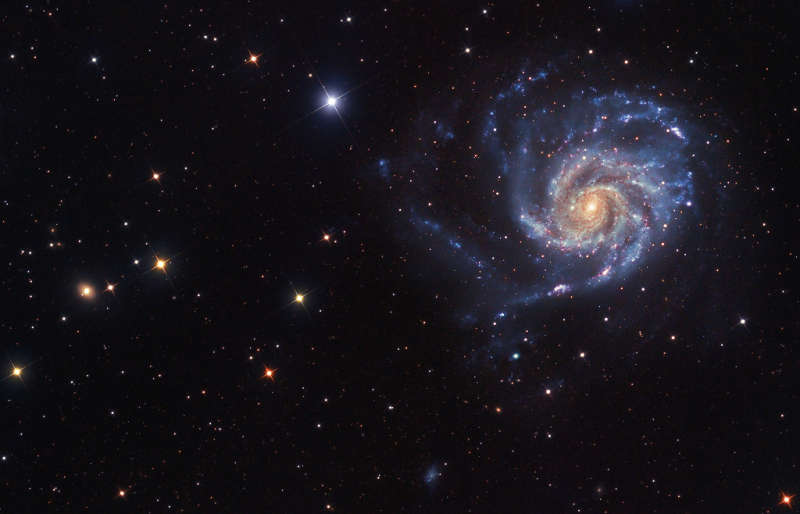
|
Credit & Copyright: Laszlo Bagi
Explanation:
Big, beautiful spiral galaxy M101 is one of the last
entries in Charles
Messier's famous catalog, but definitely not
one
of the least.
About 170,000 light-years across, this galaxy is enormous,
almost twice the size of our own Milky Way galaxy.
M101 was also one of the original
spiral
nebulae observed by Lord Rosse's large
19th century
telescope, the Leviathan of Parsontown.
M101 shares this modern telescopic field of view with
spiky foreground stars within the Milky Way, and more
distant background galaxies.
The colors of the Milky Way
stars can also be
found in the starlight from the large island universe.
Its core is dominated by light from cool yellowish stars.
Along
its grand spiral arms are the blue colors of hotter, young stars mixed
with obscuring dust lanes and pinkish star forming regions.
Also known as the
Pinwheel Galaxy,
M101 lies within
the boundaries of the northern constellation Ursa Major,
about 25 million light-years
away.
|
January February March April May June July August September October November December |
| ||||||||||||||||||||||||||||||||||||||||||||||||
NASA Web Site Statements, Warnings, and Disclaimers
NASA Official: Jay Norris. Specific rights apply.
A service of: LHEA at NASA / GSFC
& Michigan Tech. U.
Based on Astronomy Picture
Of the Day
Publications with keywords: M 101 - spiral galaxy
Publications with words: M 101 - spiral galaxy
See also:
- Webb and Hubble: IC 5332
- APOD: 2026 February 4 Á Spiral Galaxy NGC 1512: Wide Field
- Barred Spiral Galaxy NGC 1365 from Webb
- APOD: 2026 January 14 Á M51: The Whirlpool Galaxy
- IC 342: Hidden Galaxy in Camelopardalis
- NGC 253: Dusty Island Universe
- APOD: 2025 November 5 Á Spiral Galaxy NGC 3370 from Hubble
